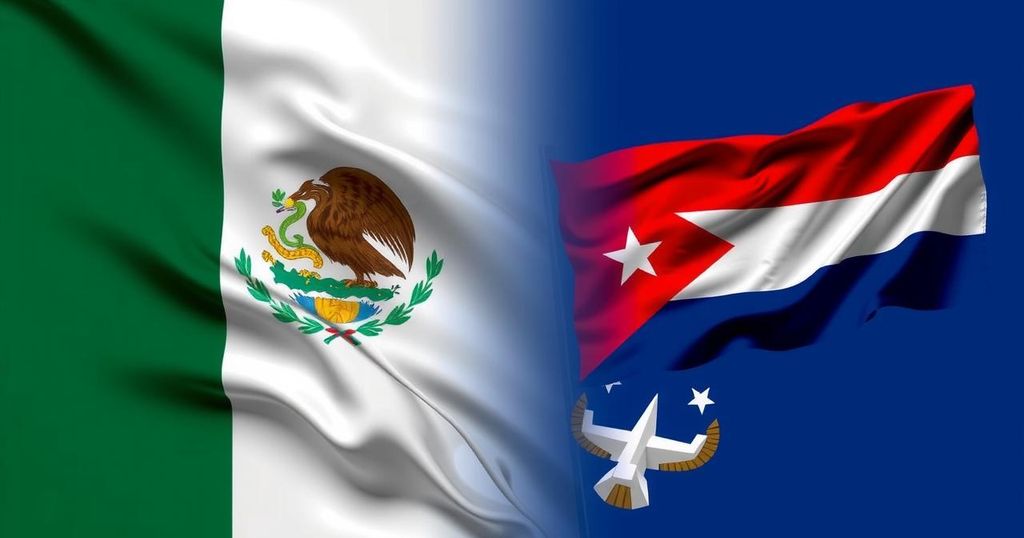Mexico’s Complicit Support for Cuba’s Dictatorship

Mexico has aligned itself with Cuba’s dictatorship by providing substantial support, joining historical benefactors Russia and Venezuela. Despite domestic violence and instability, the Mexican government has prioritized aid to Cuba, dismissing the plight of its people and the need for democratic reforms, thereby undermining its own democratic principles.
In recent developments, Mexico has joined Russia and Venezuela in providing substantial support to Cuba, further entrenching the longest-standing dictatorship in the Americas. Historically, the Soviet Union had been the main benefactor to Cuba, contributing over $29 billion in various forms of aid, including food and oil, a debt which Russia ultimately forgave. Following the disintegration of the Soviet bloc, Hugo Chavez’s Venezuela became Cuba’s primary supplier, investing approximately $35 billion in oil assistance over 15 years. As Venezuela faces significant turmoil, Mexico has emerged as Cuba’s new supporter, exporting food, oil, and other resources in an attempt to bolster the Cuban regime. Despite these efforts, Cuba’s struggling communist economy remains beyond salvage. The Mexican government has engaged in questionable diplomatic maneuvers, including threatening to leverage cooperation with the United States on migration issues to secure dialogue with Cuba. Mexico notably declined an invitation to the 2022 Summit of the Americas, specifically due to the exclusion of Cuba, Nicaragua, and Venezuela from the guest list. Amid a severe security crisis within its own borders, marked by escalating violence including car bombings and assassinations, Mexico’s President Claudia Sheinbaum has prioritized support for Cuba. In 2023, under the previous administration of Andrés Manuel López Obrador, Mexico committed to supplying Cuba with 5.4 million barrels of oil, a significant gesture amounting to $391 million, while Cuba grapples with over 1,100 political prisoners and has persistently denied its citizens free elections over 65 years of dictatorship. Sheinbaum’s promises have indicated blind loyalty to the Cuban regime rather than genuine concern for the Cuban populace. The aid, which includes shipments of oil and meat, is obscured by opaque governmental arrangements, reminiscent of Venezuela’s previous dealings that involved Cuban medical professionals serving as inexpensive labor for oil payments. The ramifications of Mexico’s solidarity with Cuba have begun to surface, as evident from a notable blackout affecting millions in May 2023, drawing parallels to Venezuela’s pre-collapse situation. Mexico has progressed from casual donations to Cuba, emerging as its second largest oil supplier, surpassing both Russia and Venezuela. The Cuban regime persists in its failures, transitioning from an agricultural exporter to a nation reliant on external food assistance due to poor governance, corruption, and lack of investment. Mexico’s support of Cuba undermines its own democratic values, evidenced by rapid judicial reforms that diminish transparency and militarize security measures. Notably, if Mexico’s intentions were truly altruistic, aid would be contingent upon Cuba releasing political prisoners, instituting free elections, and ceasing widespread human rights abuses. The persistence of dictatorial regimes such as Cuba, Nicaragua, and Venezuela is fueled not only by their intrinsic brutality but also through the disgraceful support from nations like Mexico that benefit from democratic freedoms while simultaneously rejecting democratic principles. Arturo McFields, an exiled journalist and former Nicaraguan ambassador, reflects on these troubling dynamics in his analysis of Mexico’s role in perpetuating the Cuban dictatorship.
The article examines Mexico’s contemporary relationship with Cuba, situating it within a historical context of international support for the Cuban regime. It outlines the transition of Cuba’s primary benefactors from the Soviet Union to Venezuela and now to Mexico. The article also highlights the troubling nature of Mexico’s diplomacy regarding Cuba, especially in light of its own domestic issues marked by violence and chaos. It critiques the moral implications of Mexico’s unwavering support for a repressive regime.
In summary, Mexico’s support for Cuba represents a troubling alignment that not only undermines its democratic values but also endangers its own citizens by prioritizing international solidarity over domestic stability. The government’s decisions signal an alarming trend towards authoritarianism and complicity with oppressive regimes, raising critical questions about Mexico’s commitment to democracy and human rights.
Original Source: thehill.com








